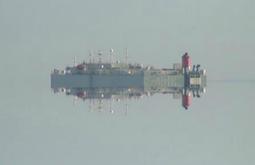"Paradox of Plenty (Futurology) is a two channel video installation of related apocalyptic tableaux to be projected on opposite walls. The work incorporates 3D video animation with high definition footage. The narrative is meant to be oblique and slow, encompassing disjointed, but related passages of conflict- the prequel and its aftermath.
This channel obliquely investigates edifices such as the Auckland Sky Tower, airport terminals, a natural gas cargo ship, and the Seattle Space Needle. Each of these structures is mirrored along a single axis, a minor adjustment that has a major affect: the ordinary, practical edifices become features of a fantastic, Flash Gordon—esque City of the Future; or the assets of a post- apocalyptic military force. A slightly blurry, flattened aesthetic with reduced colour differentiation gives the work an unreal, almost cartoony, retro feel. The work reads like a 1970s vision of the future, or an alternate reality.
The work's futuristic ships have a double nature that goes beyond their mirrored symmetry. They are practical and functional, like the industrial constructions they are, but also dream-like. They are aspirational, but also threatening, with a military or bomb-like aspect. However much they are altered by their mirroring, though, these remain recognisable as structures that exist now, in today's world; structures that are vaguely dystopian: mundane, transitory, bad for the environment, or just outmoded.
The term paradox of plenty is defined as is the paradox of nations who are rich in natural resources— often energy resources—frequently engaging in energy related conflict." - Artist Statement
Futurology Part 2 (2011)
Other works in this series

Brit Bunkley
Futurology Part 1 (2012)
A two channel installation of apocalyptic tableaux made with animation and original footage.